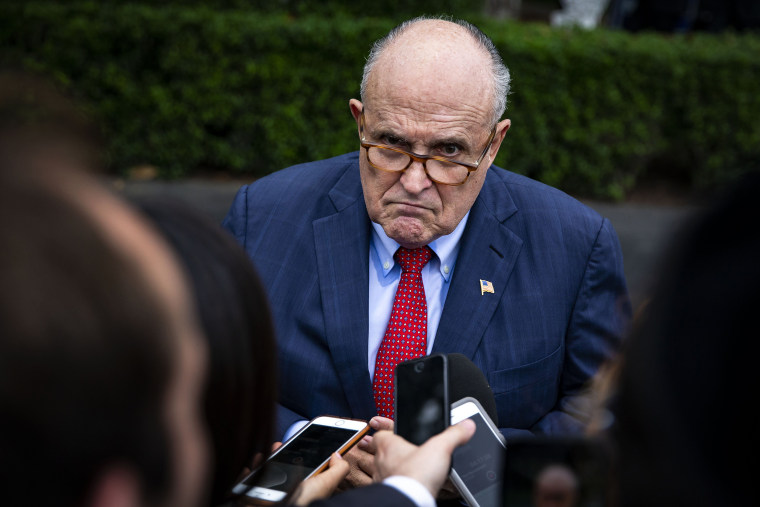According to one statement from his personal lawyer, former New York City Mayor Rudolph Giuliani, President Donald Trump will not answer written or verbal questions from special counsel Robert Mueller about any Russian collusion with the president’s campaign. (Giuliani subsequently told NBC News that any such questions were "not ruled in or out.")
But whatever Giuliani says when quizzed by any given reporter, Watergate history tells us that Trump is likely to reject even this watered-down attempt by Mueller to secure his testimony in written answers.
Even with lawyer-crafted answers, Trump will open himself up to potential perjury charges if his written answers conflict with sworn grand jury testimony of other witnesses or — more importantly — with documentary proof contradicting his answers. This potential outcome so concerned Trump’s previous lawyer John Dowd that he staged a mock interrogation of Trump that did not go well. Before resigning, Dowd subsequently warned Trump not to testify, according to Bob Woodward’s new book.
Richard Nixon, for his part, was self-aware of the danger of answering questions about Watergate under oath, and so he never did. Rather he issued public statements proclaiming his innocence in the Watergate cover-up — statements which later were shown to be false.
In 1973 when the Senate Select Committee (chaired by Sen. Sam Ervin, D-N.C.) was investigating Watergate, the Committee sought the testimony of White House officials and Nixon. White House counsel John Dean recommended to Nixon that his aides provide written sworn answers rather than be questioned orally.
In a March 13, 1973 White House meeting, Dean told Nixon: “[As] a lawyer... you can handle written interrog—, interrogatories, where cross-examination is another ballgame.” Nixon answered: “I know.” But the cover-up began unraveling soon afterward, when Dean admitted his culpability in criminal activities and implicated the President in his own sworn testimony.
When Dean testified before the Senate Committee on June 28, Ervin pointedly asked Dean about the inadequacy of written statements as a substitute for oral testimony: “Is there any way whatsoever to test the credibility of anybody when the credibility has to be judged merely upon the basis of a written statement?”
Dean replied, “No, sir.”
After Dean testified before the Committee, both Ervin and the ranking Republican, Sen. Howard Baker, R-Tenn., publicly called for Nixon to respond under oath to these allegations about Watergate. Nixon declined to do so.
In a letter sent to Ervin in early July 1973, Nixon in part softened his resistance and allowed past and then-present White House aides to testify in person in the Senate hearings, although he refused to allow White House documents to be produced. In that same letter, Nixon declined to appear voluntarily as a witness before the Senate Select Committee, writing that he “must and shall resist” the committee’s request that he testify under oath. Citing the separation of powers, Nixon said his testimony before Congress would cause “irreparable damage.”
While Nixon never provided sworn testimony in person or under oath, his lies — in public statements — about Watergate were cited as one of the grounds by the House Judiciary Committee for his impeachment for obstruction of justice.
Among the nine specifications of obstruction of justice in Article I of the articles of impeachment approved by the House Committee prior to Nixon’s resignation was the charge that Nixon made “false and misleading statements for the purpose of deceiving the people of the United States into believing” that there was no misconduct by his campaign and members of his administration.
Trump is in the same quandary with regard to Mueller’s probe as Nixon was in dealing with the Senate Watergate investigation. Like Nixon, Trump has not claimed executive privilege to block his past and present aides — including White House counsel Donald McGahn — from testifying to prosecutors or the grand jury. But like Nixon, Trump (through his lawyers) has heretofore balked at testifying himself.
Mueller’s purported offer, apparently publicly rejected by Giuliani, to accept written responses as to the collusion prong of his investigation appears to be only an interim position. Mueller may still demand, by subpoena if necessary, that Trump testify about obstruction of justice.
The broader issue for the presidency is that acceptance of any Mueller proposal does not remove the risk of Trump being compelled by the courts to testify regarding the obstruction of justice investigation, but rather weakens Trump’s legal argument against enforcement of a subpoena. If it is appropriate for Trump to give sworn answers on one topic, it is not clear why it is unconstitutional (or, in the words of Nixon a source of “irreparable damage”) to testify on a different topic being pursued by Mueller.
And Mueller’s last proposal to accept sworn written answers from Trump still poses the risk of a perjury charge, because the lawyers drafting his answers cannot know for certain either what Trump’s actual involvement has been or what Mueller knows from others about Trump’s involvement.
So while Trump will likely reject the request voluntarily to testify, just as Nixon did, Mueller will still then have to decide whether to subpoena Trump to testify — or, as occurred in the Watergate congressional and special prosecutor investigations, make the case without his testimony.


